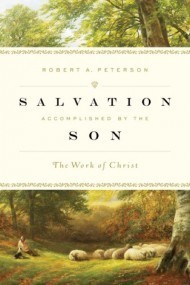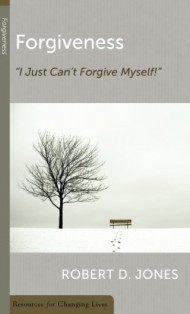Justin Taylor's Blog, page 267
November 9, 2011
Salvation Accomplished by the Son: The Work of Christ
 John Frame on Robert Peterson's new volume on Christ's saving work:
John Frame on Robert Peterson's new volume on Christ's saving work:
"Salvation Accomplished by the Son is systematic theology at its very best . . . the kind of systematics of which we need much more. To explore any question about Jesus's incarnation, atonement, or resurrection, this is the book to which, after Scripture itself, I would turn first."
You can preview it below:
How to Give an ETS Conference Paper
If you are giving a paper next week at ETS—that is, the annual meeting of the Evangelical Theological Society—please read this post first from Fred Sanders.
Write to Understand
Calvin, citing Augustine: "I count myself one of the number of those who write as they learn and learn as they write."
Ed Welch: "I find that there are three levels of clarity. When I only think about something, my thoughts are embryonic and muddled. When I speak about it, my thoughts become clearer, though not always. When I write about it, I jump to a new level of clarity."
John Piper: "Writing became the lever of my thinking and the outlet of my feelings. If I didn't pull the lever, the wheel of thinking did not turn. It jerked and squeaked and halted. But once a pen was in hand, or a keyboard, the fog began to clear and the wheel of thought began to spin with clarity and insight."
Arthur Krystal: "Like most writers, I seem to be smarter in print than in person. In fact, I am smarter when I'm writing. I don't claim this merely because there is usually no one around to observe the false starts and groan-inducing sentences that make a mockery of my presumed intelligence, but because when the work is going well, I'm expressing opinions that I've never uttered in conversation and that otherwise might never occur to me. Nor am I the first to have this thought, which, naturally, occurred to me while composing. According to Edgar Allan Poe, writing in Graham's Magazine, 'Some Frenchman—possibly Montaigne—says: 'People talk about thinking, but for my part I never think except when I sit down to write.' I can't find these words in my copy of Montaigne, but I agree with the thought, whoever might have formed it. And it's not because writing helps me to organize my ideas or reveals how I feel about something, but because it actually creates thought or, at least supplies a Petri dish for its genesis."
Wallace v. Ehrman: Can We Trust the Text of the New Testament?
A little trailer for the debate DVD now available for purchase at CSNTM.org:
Ed Komoszewski provides a detailed account of the debate, including a summary of Dr. Wallace's central argument:
(1) The New Testament has vastly more manuscripts than any other ancient author. In fact, it has more than one thousand times as many copies as the average classical author does. An impressive argument was that if we treated the rest of classical literature the way Ehrman treats the New Testament, we would have to confess ignorance about almost everything from the ancient world. This, in quick turn, would usher us back into the dark ages.
(2) The New Testament has far more manuscripts in the early centuries than any other ancient author. It boasts more than 500 manuscripts within 800 years of its completion. Within 200 years of its completion, the New Testament has three times more manuscripts than the average classical author has in 2000 years! Wallace also noted that there are as many as a dozen New Testament manuscripts (all fragments) from the second century, and more than 60 through the third. Ehrman basically ignored these facts and played his single note: We don't have the earliest copies, so how can be sure that we can get back to the text?
(3) There are two attitudes that rational people will avoid: absolute certainty and radical skepticism. When examining historical data, we simply can't be as certain as scientists are when their experiments are repeatable, controlled, and predictable. History doesn't yield itself to such certainty. But it also does not warrant the rampant skepticism that is found among many postmodernists today. Although Wallace never called Ehrman a radical skeptic, Ehrman ultimately wound up portraying himself as one. This was in spite of Ehrman's acknowledgment that a good historian deals in probabilities—precisely as Wallace had been arguing.
(4) The New Testament copying was not like the telephone game. Though Ehrman never used this analogy, his representation of the copying process was sure reminiscent of it. Wallace gave five or six reasons why this approach is false. Among his points, he mentioned that researchers can go "up the line" to earlier witnesses to find out what they said, that there were multiple lines of transmission rather than a single line, that the copying was in written rather than oral form, and that there was no desire to botch the job (which is the whole point of the telephone game).
(5) The Alexandrian family had roots that almost surely went back to the first decades of the second century. Wallace demonstrated this with P75 and B, and quoted Ehrman to prove his point! Ehrman never disputed Wallace's point, but still tried to claim that we "have no idea" what the earliest manuscripts had. That sure sounded like special pleading and simply ignoring any arguments that didn't fit Ehrman's theory.
(6) Wallace's coup de grâce was his listing of various titles of books that Ehrman had written. Wallace argued that if Ehrman was right that we simply have no idea what the original text said, then all of Ehrman's books on the New Testament would be pointless! Among them are Orthodox Corruption of Scripture; Misquoting Jesus; The New Testament: A Historical Introduction; The Text of the New Testament: Its Transmission, Corruption, and Restoration; and Forged. Wallace showed that in Forged Ehrman assumed that he knew what the words were in Paul's authentic letters (which Ehrman identifies as seven of the thirteen letters traditionally attributed to Paul), to the degree that he could pronounce judgment on the words in the Pastoral letters. It was a brilliant stroke: Forged was published earlier this year, and it simply reveals that Ehrman is massively inconsistent on what he thinks the original New Testament said. In his response, Ehrman said something to the effect that "many of those books were written nearly twenty years ago, and I have changed my mind in the last few years." Wallace responded that none of the books was twenty years old and that most of them had been written in the last five or six years. Indeed, Forged came out earlier this year. Wallace even hinted that 2000 years of New Testament scholarship would be flushed down the toilet if Ehrman's new, inconsistently-held view of the text were to win the day.
I Can't Forgive Myself

Mike Wittmer on whether you should "forgive yourself":
Initially I can appreciate why forgiving yourself might seem like a good idea. For instance, if I was driving drunk and accidentally killed another person, I think I would find the guilt unbearable. . . . I can see why it might seem necessary for me to forgive myself before I could move on with my life.
But this is why I can't go there. Forgiveness requires both a victim and an offender, and so to forgive myself means that I am playing both roles. And so a part of me is allowed—even required—to play the victim for something that I did. But I shouldn't get to play the victim, for I am the offender in this case. If I forgive myself, then I am asserting that I, like the person I killed, am a victim of my sin.
So rather than say that I must forgive myself, I think I should say that I must receive God's forgiveness. His forgiveness matters more than mine anyway, and receiving his forgiveness reminds me that my proper and only place in this matter is the offender.
If you think my position is too harsh, imagine that someone has deeply wounded you. When they come to ask for forgiveness and reconciliation, what would you think if they said, "I need you to forgive me, and then I need to forgive myself." Wouldn't you be insulted? Wouldn't you reply that after what they did, they don't get to play the victim? That they are in no way the innocent party here?
And if you are struggling under the burden of unbearable guilt, ask yourself what you really need—your forgiveness or God's? Isn't it enough for you to know that God, and the person you offended, have forgiven you?
A very helpful resource on the pastoral dimension of this issue is Robert D. Jones's Forgiveness: "I Just Can't Forgive Myself!" Before responding to someone who says he can't forgive himself, it'd be wise first to discern what the person means by this phrase. Jones suggest five possible underlying assumptions, which are not mutually exclusive:

1. The person who says, "I just can't forgive myself," may simply be expressing an inability or unwillingness to grasp and receive God's forgiveness. This seems to be the most common explanation behind "self-forgiveness" talk. We say that we can't forgive ourselves because we really doubt that God has forgiven us. Or we don't see our need for forgiveness from God, so we take over the job ourselves. Unsure of a solution to our real or perceived failure, we posit a need for self-forgiveness to satisfy our lingering guilt or to supplement God's insufficient forgiveness.
2. The person who says, "I just can't forgive myself," may not see or be willing to acknowledge the depth of his depravity. The expression "I can't forgive myself" often means "I still can't believe I did that!" . . . Inability to forgive oneself often expresses an underlying problem of self-righteousness and a lack of realistic self-knowledge.
3. The person who says, "I just can't forgive myself," may be venting his regrets for failing to achieve a certain cherished desire. In essence, such a person says this: "I had an opportunity to get something I really wanted, but I threw it all away! I can't forgive myself."
4. The person who says, "I just can't forgive myself," may be trying to establish his own standards of righteousness. In this case the expression "I can't forgive myself" is equivalent to saying, "I haven't lived up to my own perfect standards" or "I haven't lived up to other people's expectations." His longing for self-forgiveness arises from his failure to measure up to his own standards of performance, his own image of how good he is or ought to be.
5. The person who says, "I just can't forgive myself," may have ascended to the throne of judgment and declared himself to be his own judge. In this case the expression "I can't forgive myself" is equivalent to saying, "I'm in the role of Judge and will dispense forgiveness as I decide." Such a person has convened the court, rendered a guilty verdict upon himself and now believes that he must grant the needed pardon! But the Bible declares that God alone is both judge and forgiver as well as penalty-bearer for those in Christ!
November 8, 2011
The Columbo Tactic in Conversations about Christianity
 If there's one book I wish I had read before entering public university as a Study of Religion major, it would have been Greg Koukl's excellent book, Tactics: A Game Plan for Discussing Your Christian Convictions. It doesn't say everything that could be said about apologetics and evangelism and logic and winsome conversations—but it is the best introduction I've read on these issues.
If there's one book I wish I had read before entering public university as a Study of Religion major, it would have been Greg Koukl's excellent book, Tactics: A Game Plan for Discussing Your Christian Convictions. It doesn't say everything that could be said about apologetics and evangelism and logic and winsome conversations—but it is the best introduction I've read on these issues.
Here's a brief overview of one of Greg's tactics on taking the lead in conversations and making unbelievers defend and explain their views:
Using simple, leading questions is an almost effortless way to introduce spiritual topics to a conversation without seeming abrupt. At STR we call this the "Columbo" tactic, named after the bumbling and seemingly inept TV detective whose remarkable success was based on an innocent query: "Do you mind if I ask you a question?"
"Columbo" is most powerful if you have a game plan for the conversation. Generally when I ask a question I have a goal in mind. I'm alerted to some weakness, flaw, or contradiction in another's view that I want to expose in a disarming way.
Other times the question is an open-ended "What do you mean by that?" delivered in a mild, genuinely inquisitive fashion. The general topic can be anything broadly related to spiritual things. Then begin to probe with questions, gently guiding the conversation in a more spiritually productive direction.
The follow-up question, "How did you come to that conclusion?" graciously assumes the non-Christian has reasons for her view and is not just emoting. It gives her a chance to express her rationale (if she has one), giving you more material to work with.
Here's a talk by Greg where he explains more:
The Pleasure of Fear (Or, Why We Like to Be Scared at the Movies)
 Grant Horner:
Grant Horner:
If there is a God, one whom we naturally (and rightly) should fear; and if we have suppressed this truth, as Romans 1 says we have; and if, as I am arguing in this book, powerful truths such as these cannot and do not remain suppressed, then perhaps we now have a way of understanding the business and art of fear for pleasure. If God (and fear of him) has been removed from the forefront of our conscious minds, yet we are "built to fear" something infinitely greater than ourselves, something awesome, terrifying, mysterious, and incomprehensible, then we find ourselves predisposed to replace fear of him with fear of something.
The full-blown abject terror of an infinite God—unmediated by grace—would be overwhelming and impossible to bear. And try as we might, we cannot entirely vanquish our sense of God or our creeping fears regarding him. The fear is inescapable. It is also unbearable. The only thing we can do is develop techniques to cope with the fear, just like a mountain climber or a skydiver does. The fear has to be managed—it has to be controlled. Uncontrolled fear is crippling. I believe that one way this management can be undertaken (and it can be done very effectively) is through storytelling. Fiction is a management tool through which suppressed truths slowly reemerge in bits and pieces, chunks and tatters, despite our attempts to bury the way the world really is. Narrative in general, and the very powerful, reality-replacing narrative art of film, can present to us an entirely convincing object of fear that has nevertheless been controlled, tamed, and reduced to a manageable package. One moment we are petrified in the dark theater—the next we are walking to the coffee shop laughing with our friends. Not so with deity. . . .
For a believer, fearing God is a sublime, deep pleasure. That is what the ultimate fear is—pleasurable. It is not supposed to be negative, uncomfortable, or debilitating, but rather edifying by showing us who and what we are in terms of an almighty and infinite being. The fear of God, ironically, is not fearful for a Christian. Because we are wired to gain pleasure from the fear of God, yet as a race we do not so fear him, we find ourselves in the rather perverse position of experiencing certain pleasures coming to us in the form of highly manufactured and densely controlled fears packaged as entertainment. I believe this is why "fear for pleasure" has become such a profitable sector of the film industry. We want to have something to fear, and yet we want to maintain control over that fear, to limit that fear within prescribed boundaries, which we can never do in the case of the "fear of the Lord." Fearing God cannot be bounded, yet we can trust his care and love for us, his promise that he will not harm us. The precise opposite is the case in horror films: the evil entity wants to harm us—but we can control it, because we know it isn't real.
—Grant Horner, Meaning at the Movies (Crossway, 201), pp. 130, 131-132.
Tweaking the TULIP
 Despite the number in common, the "five points of Calvinism" (TULIP) don't come from the Decision of the Synod of Dordt on the Five Main Points of Doctrine in Dispute in the Netherlands (more popularly known as simply the Synod of Dort, 1618-1619).
Despite the number in common, the "five points of Calvinism" (TULIP) don't come from the Decision of the Synod of Dordt on the Five Main Points of Doctrine in Dispute in the Netherlands (more popularly known as simply the Synod of Dort, 1618-1619).
The first documented use of the TULIP acronym for the doctrines of grace can be found here. Writing in 1913, the author recalls a popular lecture from Dr. Cleland B. McAfee in 1905. Dr. McAfee was the pastor of Lafayette Avenue Church in Brooklyn at the time. (In 1913 he joined the faculty at McCormick Theological Seminary in Chicago.)
Dr. McAfee essentially gave the acronym as we know it today, except that "U" stood for "universal sovereignty" in his talk, whereas it's known today as "unconditional election."
Total depravity
Universal sovereignty
Limited atonement
Irresistible grace
Perseverance of the saints
It has become popular of later to retain the content of the "five points" but to tweak the terminology and even rearrange them for better communication. One of the more creative ones is found in Timothy George's Amazing Grace: God's Pursuit, Our Response:
Radical depravity
Overcoming grace
Sovereign election
Eternal life
Singular redemption
And it's also hard not to admire the gospel- and grace-based approach of Roger Nicole:
Grace
Obligatory grace
Sovereign grace
Provision-making grace
Effectual grace
Lasting grace
I believe that the five points—rightly understood—are gloriously true and can be clearly demonstrated exegetically—but I still had to smile at this comment in Greg Forster's forthcoming book The Joy of Calvinism: Knowing God's Personal, Unconditional, Irresistible, Unbreakable Love (Crossway, coming in February 2012):
It sometimes feels like Calvinists first invoke the five points, then apologize for invoking the five points, then explain how the five points don't really mean what they seem to mean and aren't really saying what they seem to be saying. This can't possibly be the best way to introduce people to what we believe.
Forster's own alternative brings out the trinitarian nature and redemptive progression of this teaching:
State of man before salvation: wholly defiled
Work of the Father in salvation: unconditional choice
Work of the Son in salvation: personal salvation
Work of the Spirit in salvation: supernatural transformation
State of man after salvation: in faith, perseverance
Tongue in cheek, Forster writes:
This gives us the handy mnemonic WUPSI, pronounced "whoopsie"—as in, "whoopsie, we just realized that TULIP is giving everyone heinously false ideas of what Calvinism is all about." Perhaps it's not as memorable as TULIP, but it has other virtues to make up for that.
For more on these issues, see Kenneth Stewart's third chapter in Ten Myths about Calvinism: Recovering the Breadth of the Reformed Tradition.
November 7, 2011
Squanto and the Miracle of Thanksgiving
In preparation for Thanksgiving, a great story to pass along to your kids is the story of Squanto.
Before he wrote his bestselling biographies of Wilberforce and Bonhoeffer, Eric Metaxas wrote a nicely illustrated children's book called Squanto and the Miracle of Thanksgiving, which includes the story of his Christian faith.
For an introduction or recap, see this CNN interview with Metaxas:
Another version, which does not downplay the Christian aspect of the story, is the Focus on the Family Radio Theatre drama, The Legend of Squanto.
You can stream an abridged version below:
The ESV Translation Committee Debates the Translation of "Slave"
When the ESV (English Standard Version) Translation Oversight Committee met in the summer of 2010 (at Tyndale House in Cambridge, England), the BBC stopped by to film a segment on the discussion of how best to translate the Hebrew word 'ebed and the Greek word doulos. It was a fascinating discussion of lexicography, biblical theology, ancient culture, and modern culture. The four-minute clip condenses hours of discussion based on hundreds of hours of research:
Speaking in the video are C. John Collins (Covenant Theological Seminary), Peter Williams (Tyndale House, Cambridge), Gordon Wenham (Trinity College, Bristol), Paul House (Beeson Divinity School), Wayne Grudem (Phoenix Seminary), and Lane Dennis (Crossway Books & Bibles).
The resolution to this discussion is reflected in the latest preface to the ESV:
A particular difficulty is presented when words in biblical Hebrew and Greek refer to ancient practices and institutions that do not correspond directly to those in the modern world. Such is the case in the translation of 'ebed (Hebrew) and doulos (Greek), terms which are often rendered "slave." These terms, however, actually cover a range of relationships that require a range of renderings—either "slave," "bondservant," or "servant"—depending on the context. Further, the word "slave" currently carries associations with the often brutal and dehumanizing institution of slavery in nineteenth-century America. For this reason, the ESV translation of the words 'ebed and doulos has been undertaken with particular attention to their meaning in each specific context. Thus in Old Testament times, one might enter slavery either voluntarily (e.g., to escape poverty or to pay off a debt) or involuntarily (e.g., by birth, by being captured in battle, or by judicial sentence). Protection for all in servitude in ancient Israel was provided by the Mosaic Law. In New Testament times, a doulos is often best described as a "bondservant"—that is, as someone bound to serve his master for a specific (usually lengthy) period of time, but also as someone who might nevertheless own property, achieve social advancement, and even be released or purchase his freedom. The ESV usage thus seeks to express the nuance of meaning in each context. Where absolute ownership by a master is in view (as in Romans 6), "slave" is used; where a more limited form of servitude is in view, "bondservant" is used (as in 1 Corinthians 7:21-24); where the context indicates a wide range of freedom (as in John 4:51), "servant" is preferred. Footnotes are generally provided to identify the Hebrew or Greek and the range of meaning that these terms may carry in each case.
You can read more about the ESV 2011 text update in this note from Crossway President Dr. Lane T. Dennis.
Justin Taylor's Blog
- Justin Taylor's profile
- 44 followers





